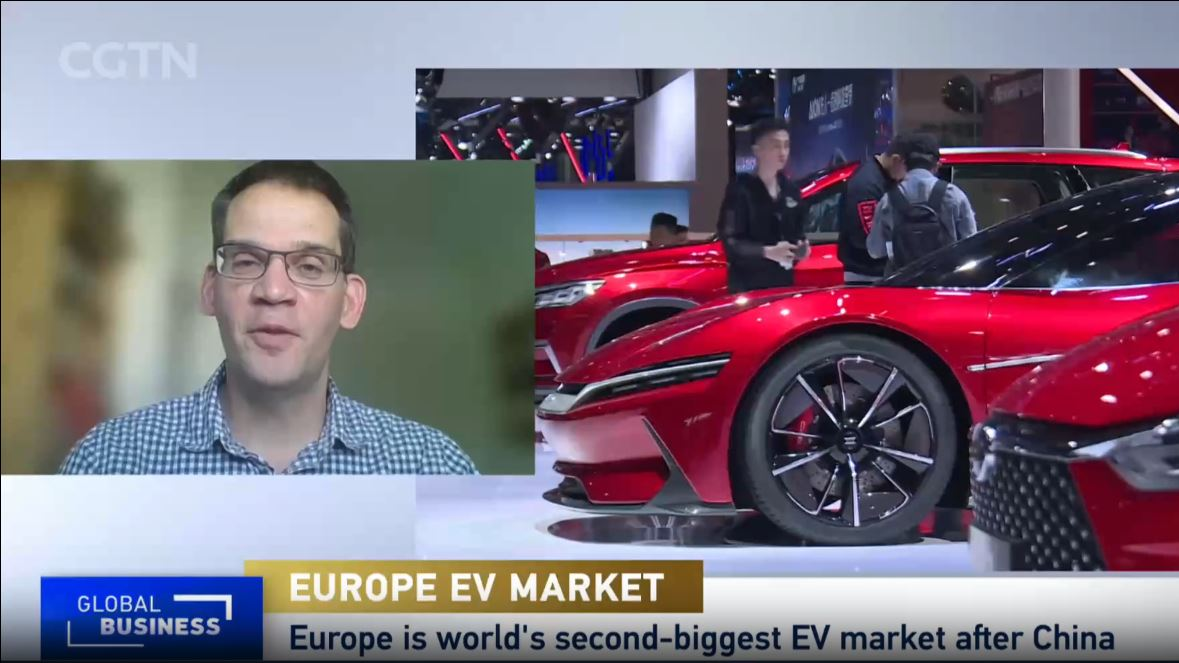03:58

WATCH: UK automotive expert Jim Holder on China's rise in making EVs
Chinese carmakers are expected to dominate the European electric vehicle (EV) market in the next three years, thanks to superior technology, competitive prices and a wave of new consumers less bothered about brand loyalty.
Beijing could secure around 15 percent of Europe's market by 2025, according to KPMG China, as demand continues to rocket with the EU announcing their banning of new fossil-fuel cars starting in 2035 to help fight the climate crisis.
It would be a huge leap for Chinese car manufacturers such as BYD, Nio, and Li Auto, as their cars accounted for less than 10 percent of the 1.1 million battery electric vehicles sold in Europe last year, says a KPMG report released in Shanghai at China's first Carbon Neutrality Expo.
Asked if European automakers should be worried about the threat of the Chinese products coming, British automotive industry expert Jim Holder told CGTN Europe: "They absolutely should be. The key point is the price that some of these vehicles are being offered.
"The real fear for the European manufacturers is that the mass market brands that are coming, they are slightly more affordable, slightly better in some cases with some of the technology they're offering.
"That really threatens to bust through the pre-conceived and preset expectations of the market."

Chinese cars set to be exported from Yantai Port. /CFP
Chinese cars set to be exported from Yantai Port. /CFP
The average price of a Chinese EV was $30,000 in Europe in 2022, says the KPMG report, compared with Tesla's cheapest Model 3, costing over $45,000. The report added that In 2022, 136 new-energy vehicles (NEVs) - a term covering battery electric vehicles (BEVs), plug-in hybrids and fuel-cell vehicles - were introduced to the market providing huge choice.
Brand familiarity in Europe is an issue, admits the report, although China was helped by its ownership of Volvo, MG, and Polestar - the top three Chinese BEV models sold in Europe last year. China's home-grown BEV models made up less than 2 percent of EV sales in Europe.
Holder added: "We know that electric vehicle buyers are much less brand loyal. From all of our studies, the combustion engine buyers are starting from scratch and building up their knowledge base. That gives Chinese brands an opportunity at least to try and establish their credentials into the market.
"They've got a long way to go, but there's no question they're coming quickly. They've built huge markets in China that are generating huge profits and they're now looking to invest in global expansion.
"They started early with electric cars. They invested heavily in the technology. They have, in some instances, quite efficient batteries available at quite impressive prices. That seems to be winning over at least a tranche of consumers over in Europe."

BYD is a huge player when it comes to new-energy electric vehicles. /CFP
BYD is a huge player when it comes to new-energy electric vehicles. /CFP
READ MORE
'Chinese EV makers caught rivals asleep at the wheel'
Chinese EV makers upbeat over European market
Germany ditches plans to only make EVs after 2035
Norbert Meyring, partner in charge of the automotive industry for KPMG China, recommends that China's EV producers could improve brand visibility by collaborating with local car dealers, or by acquiring more local car brands.
Shenzhen-headquartered BYD, which replaced Elon Musk's Tesla as the world's bestselling NEV brand, revealed recently it may build a factory in France.
The KPMG report highlights other big challenges China will face entering the European market, such as weak global economic environment, geopolitical uncertainty and constantly changing laws and regulations.
According to the European Automobile Manufacturers Association, by 2030, three out of every five cars in Europe will be electric.
With the European laws effectively banning new petrol and diesel cars in the EU from 2035, it would seem the race for a slice of the European automotive pie is about to get hotter and more electric.

Subscribe to Storyboard: A weekly newsletter bringing you the best of CGTN every Friday